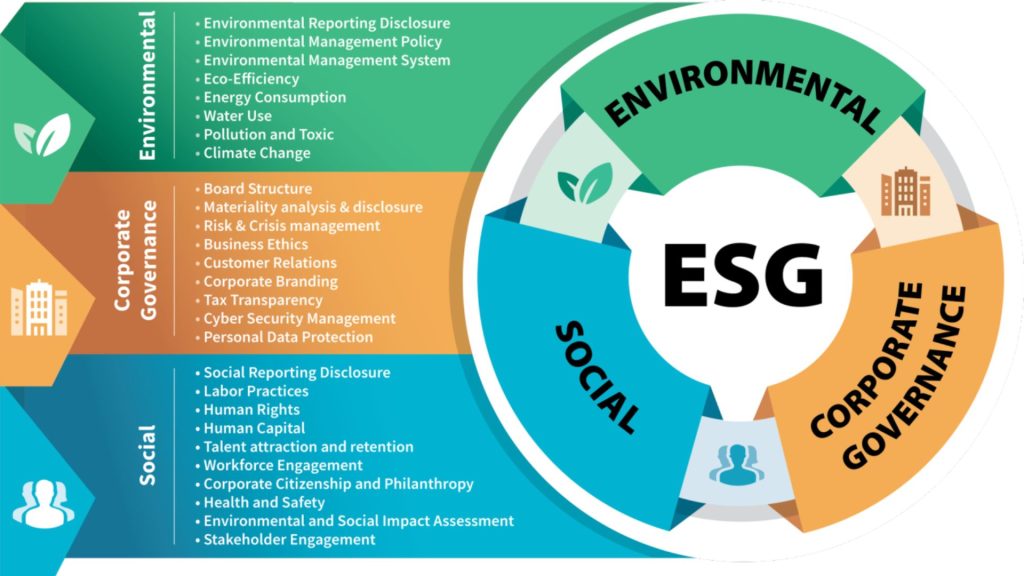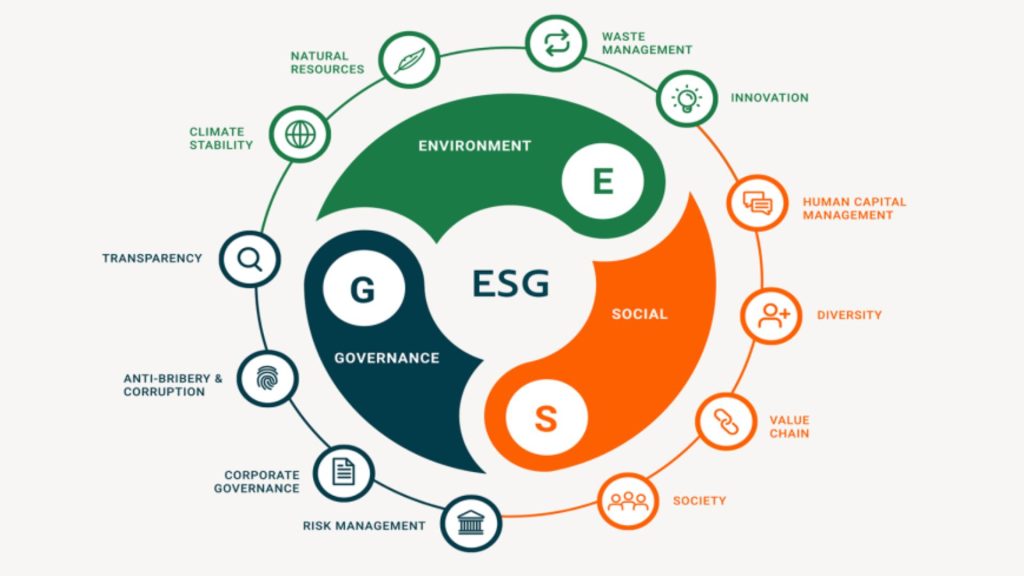
Understanding ESG: Environmental, Social, and Governance in Modern Business
In addition, Environmental, Social, and Governance (ESG) criteria are a set of standards for a company’s operations that socially conscious investors use to screen potential investments. ESG in modern business can help investors avoid companies that might pose a greater financial risk due to their environmental or other practices.
Environmental Criteria
Environmental criteria consider how a company performs as a steward of nature. This includes a company’s energy use, waste, pollution, natural resource conservation, and treatment of animals. The criteria can also help evaluate any environmental risks a company might face and how those risks are being managed.
Example: Patagonia
Moreover, Patagonia, the outdoor clothing and gear company, is well-known for its strong environmental commitment. In addition, Patagonia has implemented several practices to reduce its environmental impact, such as using recycled materials in its products and ensuring fair labor practices in its supply chain. Furthermore, the company has also pledged 1% of sales to the preservation and restoration of the natural environment through its membership in 1% for the Planet. (Source: Patagonia).
Social Criteria
Social criteria examine how a company manages relationships with employees, suppliers, customers, and the communities where it operates. This includes labor practices, product safety, community engagement, and human rights policies.
Example: Starbucks
Starbucks has been a leader in creating a socially responsible supply chain. The company has focused on ethical sourcing practices, ensuring that the coffee it buys is produced under fair labor conditions. Starbucks also invests in coffee-growing communities by funding programs that support education and healthcare. Additionally, the company has a strong commitment to diversity and inclusion within its workforce. (Source: Starbucks).
Governance Criteria
Governance criteria deal with a company’s leadership, executive pay, audits, internal controls, and shareholder rights. Investors may want to see how transparent a company is and whether it follow best practices for accounting and reporting.
Example: Apple
Apple has made significant strides in governance, particularly in the area of supply chain transparency and labor practices. The company has established strict codes of conduct for its suppliers, mandating fair treatment of workers, safe working conditions, and environmentally responsible manufacturing processes. Apple also regularly publishes reports on its supply chain practices, offering transparency to investors and consumers. (Source: Apple).
The Importance of ESG Investing

ESG investing is increasingly popular as investors recognize that companies committed to sustainable practices are often better managed and potentially more profitable in the long term. ESG factors can be indicative of a company’s overall risk management strategy and long-term sustainability.
Example: BlackRock
BlackRock, one of the world’s largest investment management companies, has been a pioneer in incorporating ESG factors into its investment decisions. In 2020, BlackRock announced that it would make sustainability a core component of its investment strategy, emphasizing that climate risk is investment risk. This shift underscores the growing importance of ESG considerations in the financial sector. (Source: Black Rock).
Implementation of ESG in Corporate Settings: Examples

ESG is generally categorized into Environment, Social, and Governance, with the image above illustrating the specific roles assigned to each category.
Environmental Initiatives
- Microsoft
– Initiative: Carbon Negative by 2030
– Description: Microsoft has committed to becoming carbon-negative by 2030, meaning it plans to remove more carbon than it emits. The company also aims to eliminate all its historical carbon emissions by 2050.
– (Source: Microsoft)
- Unilever
– Initiative: Sustainable Living Plan
–Description: Unilever’s Sustainable Living Plan sets out to decouple the company’s growth from its environmental footprint while increasing its positive social impact. Goals include reducing greenhouse gas emissions, water use, and waste.
– (Source: Unilever)
Social Initiatives
- Salesforce
– Initiative: Equality and Philanthropy
– Description: Salesforce is dedicated to equality and philanthropy, including a commitment to equal pay, supporting employee resource groups, and encouraging volunteerism through its 1-1-1 model (donating 1% of equity, 1% of employee time, and 1% of product to communities).
– (Source: Salesforce)
- Ben & Jerry’s
– Initiative: Social Mission and Activism
– Description: Ben & Jerry’s is known for its strong social mission, which includes promoting social justice, environmental sustainability, and supporting local communities. The company actively campaigns for various social issues.
– (Source: Ben & Jerry)
Governance Initiatives
- Tesla
– Initiative: Corporate Governance Policies
– Description: Tesla has implemented robust corporate governance policies that focus on board independence, transparency, and accountability. This includes a diverse and independent board of directors and regular sustainability reporting.
– (Source: Tesla)
- Intel
– Initiative: Supply Chain Responsibility
– Description: Intel has made significant strides in improving supply chain transparency and responsibility. Furthermore, the company requires its suppliers to adhere to strict labor and environmental standards and regularly audits them for compliance.
– (Source: Intel)
Integrated ESG Initiatives
- Danone
– Initiative: One Planet. One Health.
– Description: Danone’s One Planet. One Health. initiative integrates environmental and social goals into its core business strategy. This approach includes commitments to sustainable agriculture, water stewardship, and improving the nutritional quality of its products.
– (Source: Danone)
- Johnson & Johnson
– Initiative: Health for Humanity 2025 Goals
– Description: Johnson & Johnson’s Health for Humanity 2025 Goals encompass a broad range of ESG targets, including improving global health, reducing environmental impacts, and ensuring responsible business practices.
4o mini
– (Source: Johnson & Johnson)
Challenges in ESG Implementation

ESG plays a crucial role in risk management, corporate governance, innovation and many other criteria but their challenges lie in their implementation.
Despite the benefits, implementing ESG criteria is not without challenges. Companies often face difficulties in measuring and reporting ESG performance due to the lack of standardized metrics. Additionally, there can be significant costs associated with making the necessary changes to meet ESG standards.
Example: ExxonMobil
ExxonMobil has faced criticism and challenges in its ESG implementation, particularly regarding its environmental impact. However, the company has been under scrutiny for its contributions to climate change and has faced pressure from investors and activists to improve its sustainability practices. Consequently, in 2021, an activist investor won a historic proxy fight to install three new directors on ExxonMobil’s board, with the aim of pushing the company towards a more sustainable future. (Source: Reuters).
Future of ESG

The future of ESG in modern business looks promising, with increasing awareness and regulatory support driving its adoption. Additionally, governments and international bodies are stepping up efforts to promote ESG standards, which could lead to more widespread and consistent practices across industries.
Example: European Union’s Sustainable Finance Disclosure Regulation (SFDR)
Consequently, the European Union’s SFDR, which came into effect in March 2021, is a significant step towards standardizing ESG disclosures. Specifically, the regulation requires financial market participants to provide detailed information on how they integrate ESG factors into their investment decisions. Ultimately, this move aims to enhance transparency and help investors make more informed decisions based on standardized ESG data.(Source: Europa).
Earth5R: Empowering Corporates with ESG Solutions

Earth5R is a global environmental organization that focuses on sustainability, social equity, and responsible governance. By providing comprehensive ESG solutions, Earth5R helps corporations integrate these principles into their operations. Here are several ways Earth5R can assist corporates with ESG initiatives, along with examples and sources for reference.
Environmental Initiatives
- Sustainability Audits and Assessments
– Description: Earth5R conducts detailed sustainability audits and assessments to help companies understand their environmental impact. This includes evaluating energy usage, waste management practices, and resource consumption.
– Example: A multinational corporation seeking to reduce its carbon footprint can benefit from Earth5R’s environmental audits, which provide actionable insights and strategies for improvement.
– (Source: Earth5R)
- Circular Economy Projects
– Description: Earth5R promotes the circular economy by helping businesses implement recycling, upcycling, and waste reduction programs. Moreover, this not only reduces environmental impact but also enhances resource efficiency.
– Example: A consumer goods company can partner with Earth5R to develop a circular economy initiative, turning waste products into new materials or products.
– (Source: Earth5R)
Social Initiatives
- Community Engagement and Social Impact Programs
– Description: Earth5R assists companies in designing and implementing social impact programs that engage with and benefit local communities. This includes educational programs, health initiatives, and economic empowerment projects.
– Example: A technology firm can work with Earth5R to create a digital literacy program for underprivileged communities, fostering social inclusion and economic development.
– (Source: Earth5R)
- Employee Engagement and Training
– Description: Additionally, Earth5R provides training and workshops for employees on sustainability and social responsibility, helping to build a culture of environmental stewardship and social equity within the organization.
– Example: A manufacturing company can use Earth5R’s training services to educate its workforce on sustainable practices and corporate social responsibility.
– (Source:Earth5R)
Governance Initiatives
- ESG Reporting and Compliance
– Description: Earth5R offers expertise in ESG reporting, helping companies meet regulatory requirements and investor expectations. This includes guidance on best practices for transparency and accountability.
– Example: A financial services company can leverage Earth5R’s expertise to enhance its ESG reporting, ensuring compliance with international standards and improving investor confidence.
– (Source: Earth5R)
- Stakeholder Engagement
– Description: Earth5R facilitates stakeholder engagement processes, ensuring that companies maintain open and constructive dialogue with all relevant parties, including investors, customers, and communities.
– Example: An energy company can collaborate with Earth5R to develop a stakeholder engagement strategy, addressing concerns and fostering trust among its stakeholders.
– (Source: Earth5R)
Integrated ESG Solutions
- Green Certifications and Eco-Labeling
– Description: Earth5R helps businesses achieve green certifications and eco-labels, which demonstrate their commitment to environmental and social responsibility. This can enhance brand reputation and customer loyalty.
– Example: A retail chain can work with Earth5R to obtain eco-certifications for its products, signaling to consumers its dedication to sustainability.
– (Source: Earth5R)
- Sustainable Supply Chain Management
– Description: Earth5R assists companies in creating sustainable supply chains by evaluating suppliers’ environmental and social practices and recommending improvements.
– Example: A global food and beverage company can engage Earth5R to assess and enhance the sustainability of its supply chain, ensuring ethical sourcing and reducing environmental impact.
– (Source: Earth5R)
Furthermore, by focusing on environmental stewardship, social responsibility, and good governance, companies can not only attract socially conscious investors but also ensure their own sustainability and success in a rapidly changing world. Furthermore, the examples of Patagonia, Starbucks, Apple, BlackRock, and others demonstrate the diverse ways in which companies can embrace ESG principles, each facing unique challenges and opportunities. As ESG considerations continue to gain momentum, they are set to redefine the landscape of corporate responsibility and investment strategies in the years to come.
Earth5R Partnership
Companies interested in partnering with Earth5R in River Cleanups, Beach Cleanups or Lake cleanup Programs can write to us at community@earth5r.org or Call us on 9920045587.
Please give us ample time to design events & projects as per requirements.
At Earth5R, we support you every step of the way, from planning and building communities to selecting volunteers, executing projects, and managing them.
Additionally, we handle event reporting and management on our app and social media platforms.
Therefore, we help companies improve their ESG ranking and portfolio by making a real impact through participation in national environmental programs.


